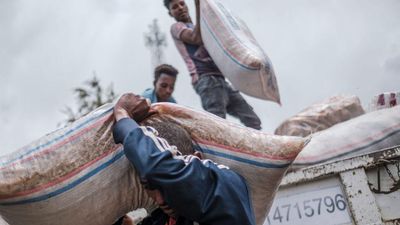Ethiopian Crisis is "A Stain On Our Conscience" Says UN Official
The choice words were used to describe the global reaction to the famine-ridden East African country.
The United Nation's humanitarian chief, Martin Griffiths, has called the crisis in Ethiopia, "a stain on our conscience", as thousands starve to death in the northern region, Tigray. In an interview with the Associated Press, Griffiths recalled Ethiopia's famine in the 1980s and the subsequent deaths of some 1 million people. "That's what keeps people awake at night, is worrying about whether that's what is in prospect, and in prospect soon," he said.
In what has been deemed as the worst hunger crisis in more than a decade, and a full year into an ever-present civil war, all eyes are on the East-African region. The comments made by the humanitarian chief are not altogether surprising, however, as the UN has mentioned how hard it has been to get resources to Tigray, as government and allied forces have been accused of keeping support away from those in need. According to Griffiths, Tigray residents are being blocked from receiving food as well as medical supplies and fuel, with only 10% of the essential humanitarian supplies needed having reached Tigray in recent weeks.
"So, people have been eating roots, flowers and plants instead of a normal steady meal", Griffiths said, "The lack of food will mean that people will start to die."
Vulnerable, pregnant women and children continue to suffer greatly as they are often the first to die of disease, Griffith observed during a recent visit to Tigray. The "de facto blockade" by the government and the war has resulted in missed vaccinations for an estimated 200,000 children. According to the UN, in the first half of September, 22.7% of children living in Tigray under 5 are malnourished, while more than 70% of 11,000 pregnant or breastfeeding women are acutely malnourished. "As a comparison this is about the same levels of malnutrition that we saw in 2011 in Somalia at the onset of the Somali famine," Griffiths said.
Among other things, phone, internet, and banking services are also being denied to Tigray, which is making news of the crisis getting out of the region virtually impossible. A community letter from Mekelle University, a higher education and training public institution located in Mekelle, Tigray, Ethiopia, forewarned the UN that, "[Tigray] is experiencing a man-made form of famine that belittles the 1984 famine in its severity."
This news comes as the Ethiopian government fired 7 United Nations officials for "meddling" and ordered their immediate departure from their country.
Check outOkayAfrica's CrossroadsCrossroads, a special series examining Global Africa at critical moments. For our first package, we will dedicate 4 weeks of coverage to examining the lands of Ethiopia through a deep dive into music, politics, and culture.
- CROSSROADS - OkayAfrica ›
- Ethiopian Prime Minister Abiy Ahmed Wins Nobel Peace Prize ... ›
- Prime Minister Abiy Ahmed Ends Internet Shutdown in Ethiopia ... ›
- Heavy Is the Head: The Trials of Abiy Ahmed - OkayAfrica ›
- Who is Abiy Ahmed? Two years ago, the Ethiopian Prime Minister ... ›
- The Weeknd is Helping Bring Back the Ancient Ethiopian Language ... ›
- Coachella Artists Join With UN Officials in Fight Against Global Hunger - OkayAfrica ›
- Sudan is on the Verge of the World’s Largest Hunger Crisis; Here’s How to Help - Okayplayer ›
